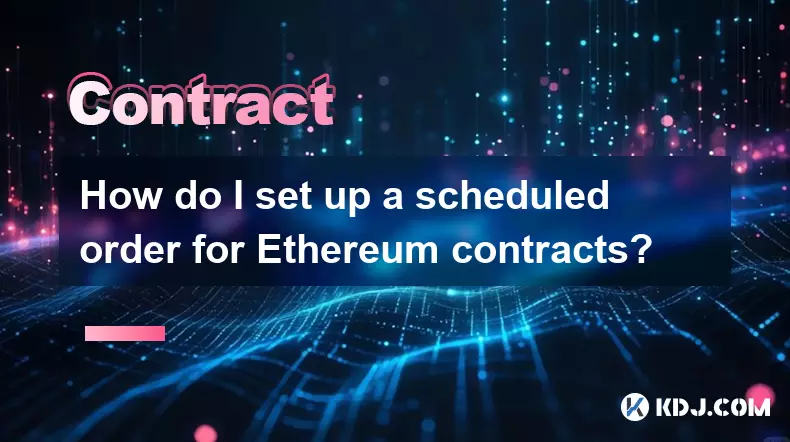-
 bitcoin
bitcoin $87959.907984 USD
1.34% -
 ethereum
ethereum $2920.497338 USD
3.04% -
 tether
tether $0.999775 USD
0.00% -
 xrp
xrp $2.237324 USD
8.12% -
 bnb
bnb $860.243768 USD
0.90% -
 solana
solana $138.089498 USD
5.43% -
 usd-coin
usd-coin $0.999807 USD
0.01% -
 tron
tron $0.272801 USD
-1.53% -
 dogecoin
dogecoin $0.150904 USD
2.96% -
 cardano
cardano $0.421635 USD
1.97% -
 hyperliquid
hyperliquid $32.152445 USD
2.23% -
 bitcoin-cash
bitcoin-cash $533.301069 USD
-1.94% -
 chainlink
chainlink $12.953417 USD
2.68% -
 unus-sed-leo
unus-sed-leo $9.535951 USD
0.73% -
 zcash
zcash $521.483386 USD
-2.87%
How do I set up a scheduled order for Ethereum contracts?
Scheduled Ethereum contract orders automate trading on platforms like Binance and Bybit, enabling precise, emotion-free execution based on time or price triggers.
Sep 24, 2025 at 05:19 pm

Scheduled Orders in Ethereum Contract Trading
Trading Ethereum contracts through scheduled orders allows users to automate their investment strategies. This method reduces emotional interference and enables precise execution based on predefined market conditions. Many cryptocurrency exchanges now support recurring or time-based order placements specifically for futures and perpetual contracts involving ETH.
- Access the derivatives or futures section of your preferred exchange platform.
- Select the Ethereum-based contract pair such as ETH/USDT or ETH/USD.
- Locate the “Scheduled Order” or “Recurring Order” option within the trading interface.
- Define the frequency, amount, entry price, and total duration of the order series.
- Confirm identity and authorize the recurring transaction using two-factor authentication.
Key Platforms Supporting Automated Ethereum Contract Orders
Several leading crypto exchanges have integrated tools that allow automated placement of Ethereum derivative contracts. These platforms offer varying degrees of customization, including time intervals, price triggers, and risk management parameters.
- Binance Futures provides a “Grid Bot” and “Time-Based Recurring Orders” for ETH contracts, allowing traders to set daily, weekly, or custom schedules.
- Bybit supports smart trading bots that can execute long or short positions on ETH perpetual swaps at user-defined times.
- OKX offers a comprehensive suite of algorithmic trading options, including TWAP (Time-Weighted Average Price) orders ideal for large ETH contract entries.
- KuCoin’s futures platform includes scheduled trigger mechanisms linked to technical indicators or time cycles.
- Gate.io enables API-driven scheduling, giving advanced users full control over execution logic for Ethereum-based derivatives.
Technical Requirements and Security Measures
Setting up scheduled Ethereum contract orders requires more than just selecting a time and amount. Users must ensure proper security protocols are in place and understand the technical dependencies involved in automated trading systems.
- Enable two-factor authentication (2FA) across all trading accounts handling scheduled executions.
- Use API keys with restricted permissions—only grant access to trading functions, never withdrawals.
- Monitor network congestion on the Ethereum blockchain, especially when settlements involve on-chain components.
- Regularly audit active bots and scheduled tasks to prevent unintended exposure due to outdated configurations.
- Store backup recovery phrases offline and ensure session timeouts are enabled on all devices.
Risks Associated with Scheduled Ethereum Contract Trading
While automation increases efficiency, it also introduces new vulnerabilities. Market volatility, slippage, and technical failures can amplify losses when trades are executed without real-time oversight.
- Sudden price gaps during low-liquidity periods may result in unfavorable fill prices for scheduled entries or exits.
- Exchange downtime or API outages can delay or cancel planned orders, disrupting strategy continuity.
- Over-leveraged scheduled positions increase liquidation risks during sharp reversals in ETH value.
- Misconfigured bots might trigger multiple overlapping orders, leading to excessive position sizes.
- Regulatory changes affecting derivatives trading could invalidate certain types of automated strategies overnight.
Frequently Asked Questions
Q: Can I modify a scheduled Ethereum contract order after it has been activated?A: Yes, most platforms allow adjustments to active scheduled orders, including changing the quantity, price, or frequency. However, modifications may only apply to future instances, not already-executed trades.
Q: Are scheduled Ethereum contract orders taxable events?A: Each executed installment of a scheduled order typically counts as a separate trade, which may trigger tax reporting obligations depending on jurisdiction. Consult a tax professional familiar with crypto regulations.
Q: Do I need to keep my device running to maintain scheduled orders?A: No, once configured on the exchange server or via cloud-based bot services, the orders run independently of your personal device.
Q: What happens if my account balance is insufficient when a scheduled order triggers?A: The system will skip that iteration of the order and log a failure. You’ll need to adjust funding levels or reduce order size to avoid repeated failures.
Disclaimer:info@kdj.com
The information provided is not trading advice. kdj.com does not assume any responsibility for any investments made based on the information provided in this article. Cryptocurrencies are highly volatile and it is highly recommended that you invest with caution after thorough research!
If you believe that the content used on this website infringes your copyright, please contact us immediately (info@kdj.com) and we will delete it promptly.
- ZAMA Token's Imminent Launch: A Price Prediction and Analysis Amidst Shifting Crypto Tides
- 2026-02-02 19:00:02
- Binance's SAFU Fund Goes Bitcoin-Heavy: A Bold Move for User Protection and Bitcoin Investment
- 2026-02-02 19:00:02
- Bitcoin's Big Dip: From Peak Hopes to Present Plunge
- 2026-02-02 18:55:01
- Coin Identifier Apps, Coin Collectors, and Free Tools: A Digital Revolution in Numismatics
- 2026-02-02 18:55:01
- APEMARS ($APRZ) Presale Ignites Crypto Market with Staggering ROI Potential Amidst Broader Market Dynamics
- 2026-02-02 18:50:02
- Bitcoin’s Bear Market: Analysts Warn of Deeper Dive Amid Economic Headwinds
- 2026-02-02 18:50:02
Related knowledge

How to close a crypto contract position manually or automatically?
Feb 01,2026 at 11:19pm
Manual Position Closure Process1. Log into the trading platform where the contract is active and navigate to the 'Positions' or 'Open Orders' tab. 2. ...

How to understand the impact of Bitcoin ETFs on crypto contracts?
Feb 01,2026 at 04:19pm
Bitcoin ETFs and Market Liquidity1. Bitcoin ETFs introduce institutional capital directly into the spot market, increasing order book depth and reduci...

How to trade DeFi contracts during the current liquidity surge?
Feb 01,2026 at 07:00am
Understanding Liquidity Dynamics in DeFi Protocols1. Liquidity surges in DeFi are often triggered by coordinated capital inflows from yield farming in...

How to use social trading to copy crypto contract experts?
Feb 02,2026 at 07:40am
Understanding Social Trading Platforms1. Social trading platforms integrate real-time market data with user interaction features, enabling traders to ...

How to trade micro-cap crypto contracts with high growth potential?
Feb 01,2026 at 02:20pm
Understanding Micro-Cap Crypto Contracts1. Micro-cap crypto contracts refer to derivative instruments tied to tokens with market capitalizations under...

How to optimize your workspace for professional crypto contract trading?
Feb 01,2026 at 08:20pm
Hardware Infrastructure Requirements1. High-frequency crypto contract trading demands ultra-low latency execution. A dedicated workstation with a mini...

How to close a crypto contract position manually or automatically?
Feb 01,2026 at 11:19pm
Manual Position Closure Process1. Log into the trading platform where the contract is active and navigate to the 'Positions' or 'Open Orders' tab. 2. ...

How to understand the impact of Bitcoin ETFs on crypto contracts?
Feb 01,2026 at 04:19pm
Bitcoin ETFs and Market Liquidity1. Bitcoin ETFs introduce institutional capital directly into the spot market, increasing order book depth and reduci...

How to trade DeFi contracts during the current liquidity surge?
Feb 01,2026 at 07:00am
Understanding Liquidity Dynamics in DeFi Protocols1. Liquidity surges in DeFi are often triggered by coordinated capital inflows from yield farming in...

How to use social trading to copy crypto contract experts?
Feb 02,2026 at 07:40am
Understanding Social Trading Platforms1. Social trading platforms integrate real-time market data with user interaction features, enabling traders to ...

How to trade micro-cap crypto contracts with high growth potential?
Feb 01,2026 at 02:20pm
Understanding Micro-Cap Crypto Contracts1. Micro-cap crypto contracts refer to derivative instruments tied to tokens with market capitalizations under...

How to optimize your workspace for professional crypto contract trading?
Feb 01,2026 at 08:20pm
Hardware Infrastructure Requirements1. High-frequency crypto contract trading demands ultra-low latency execution. A dedicated workstation with a mini...
See all articles










































































